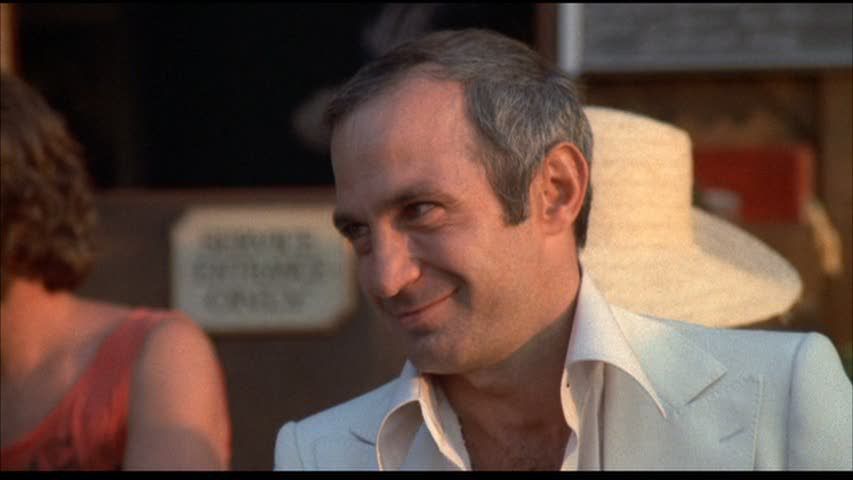
The Killing of a Chinese Bookie is, at least superficially, John Cassavetes' stab at a gangster thriller. In fact, though, the film's genre trappings are incidental to its central purpose, a character study of the charismatic loser Cosmo Vitelli (Ben Gazzara), a strip club owner who fancies himself an artist as he arranges his club's lame, unsexy nightly shows. Cosmo is a kind of vaudeville showman, orchestrating grandiose entertainments in which his dancing girls gyrate on stage while "Mr. Sophistication" (Meade Roberts), a fat, balding little man with white-face makeup and a greasy combover, sings out of tune and tells stories. The whole thing is rickety and appalling, and Cassavetes (at least in his longer, original cut of the film, before a 1978 recut) lingers on these painful stage shows, punctuated by occasional hoots and hollers whenever a girl flashes a breast. It's all so joyless, so self-evidently amateurish and boring, and yet Cosmo believes that he is an artist. He cares deeply about his club, loves his dancers, and pays careful attention to every detail of his shows. In his own weird way, he's a perfectionist, it's just that his idea of perfection is poorly staged strip shows with very little skin showing.
Basically, Cosmo is afflicted with the belief — or maybe just the half-believed hope — that he's bigger than he actually is, cooler than he is. He seems to view himself as a real player. Nowhere is this more apparent than in the sad faux-glamour of Cosmo's big celebration after he finally pays off the last of his loans on his club. The film's opening scene, with Cosmo making his last payment, is his moment of glory, his apex; he has nowhere to go but down from there. He immediately decides to celebrate by taking out three of his dancers for a day on the town. He hires a limo, dresses up in a tux, and goes to pick up each of the girls in turn, acting as though he's picking them up for a prom. They all go out to a ratty gambling parlour, where the girls, in their glam makeup and slutty, shiny dresses, lounge around rolling their eyes and looking bored, while Cosmo tries to act like the high roller they all know he isn't. It's a sad, pathetic affair, this very limited man's idea of living the good life. Moreoever, Cosmo quickly undoes the fleeting victory he enjoyed in the opening scene: after a spurt of wasteful gambling, he winds up deeply indebted to the mob, who insist he pay back what he owes by committing a murder for them. For any other director, this would be an excuse for a gritty, violent mob thriller; for Cassavetes, Cosmo's entanglement in this gangster drama only reinforces just what a lonely, out-of-place figure he is, comfortable and happy nowhere except in the shoddy fantasy world he's created within his strip club's boundaries.
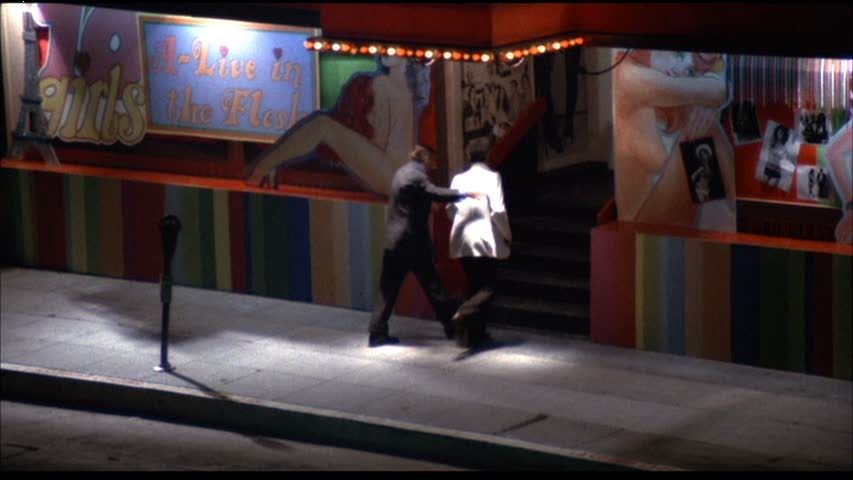

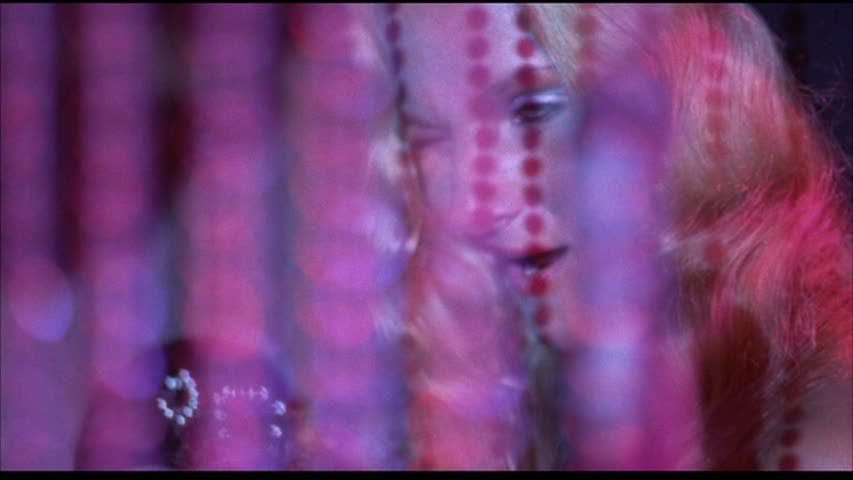

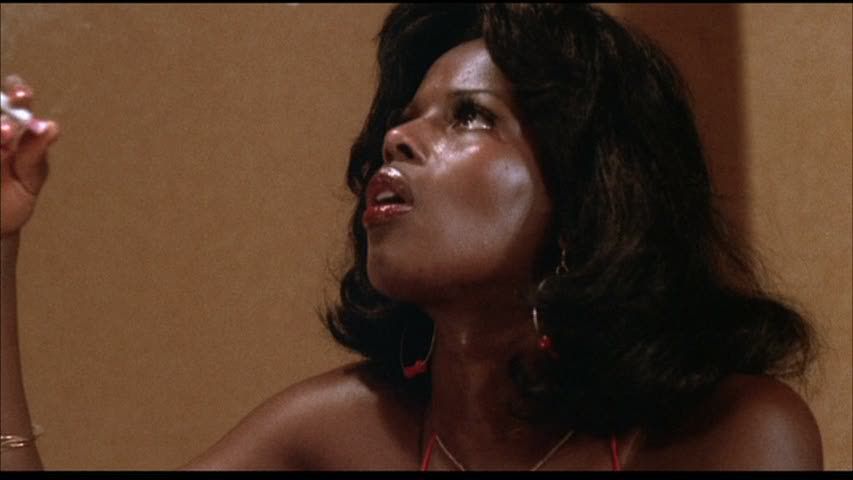
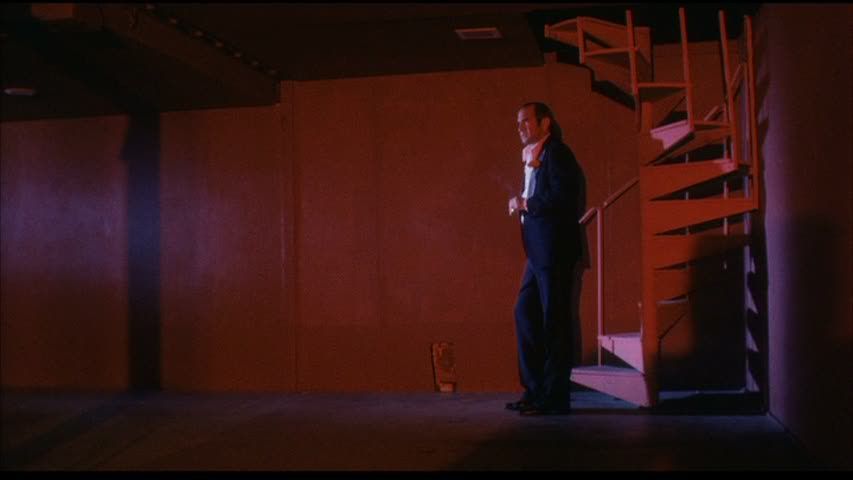

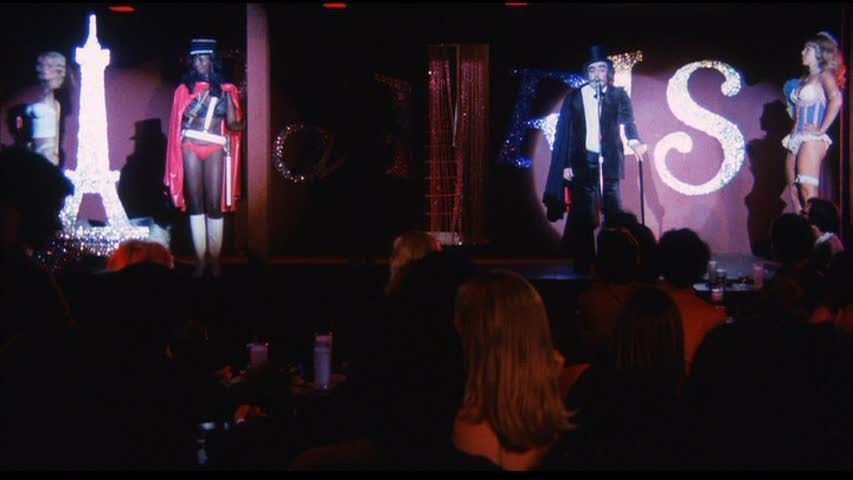

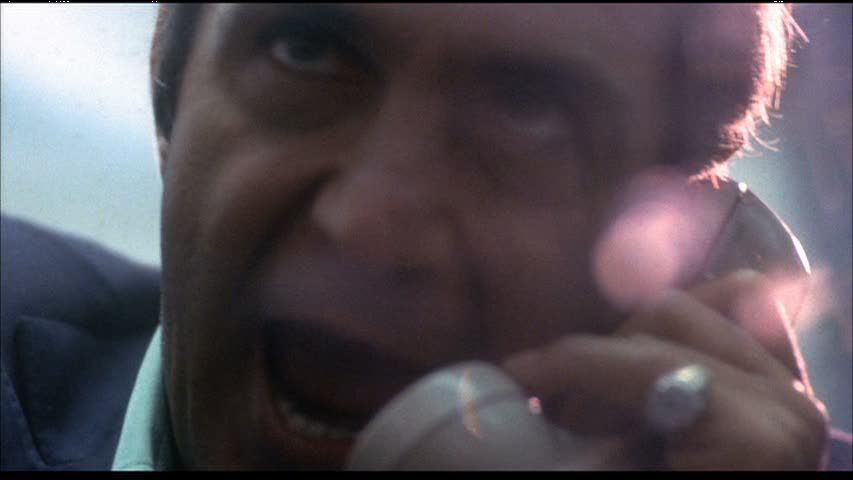



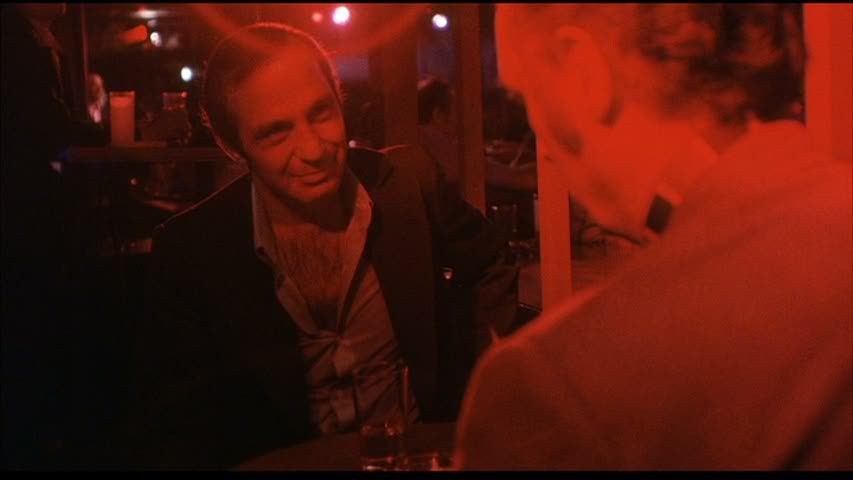
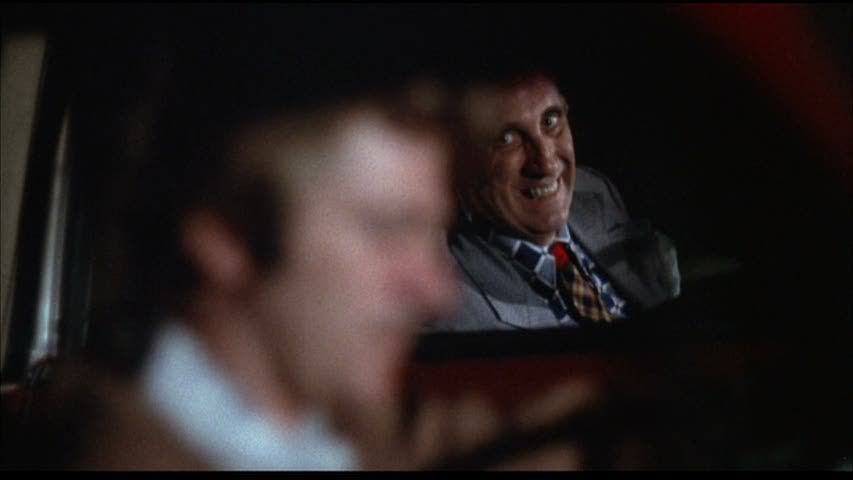
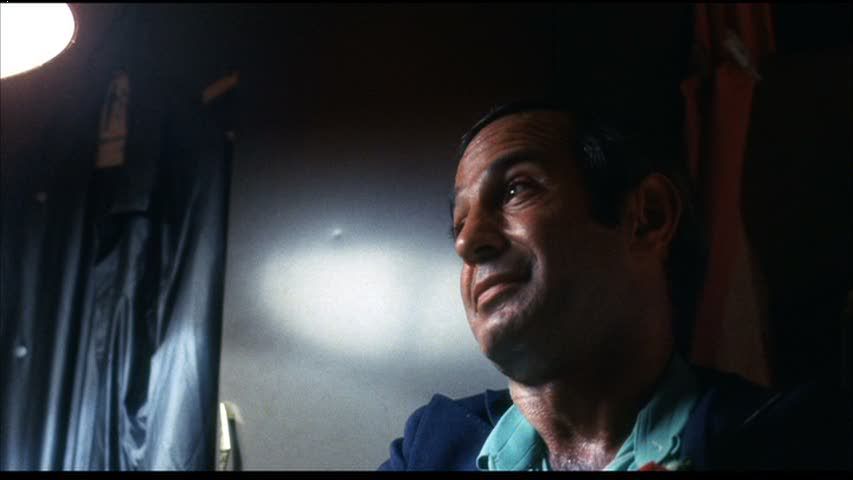
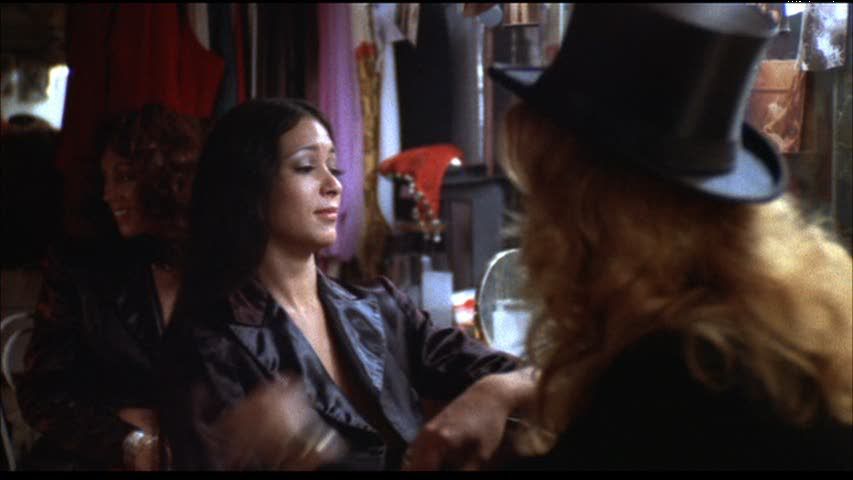



17 comments:
Sorry to say, I would not remotely have this film on any "Films That I love" listing, much as I greatly respect your own sensibilities. The film's rather loose structure, overlong scenes and some tedious dialogue worked against the more admirable crime and noir elements that established meaning and identity in the film. Hence the slow and meditative quality that is also part of the narrative is rather distancing. Of course i am a fan of Cassavetes, and other films like FACES and WOMAN UNDER THE INFLUENCE are greatly admired.
I agree with Sam. Some of the film's scenes are excruciatingly tedious with little substantial material moving forward either the "plot" or our perception of Cosmo. The production of the night club shows felt like the production of the film: amateurish and dull. Nowhere is this more evident than in the scene where Cosmo is in the back of a pitch-black taxi with the mob and their conversation, barely audible, seems to gyrate around the same things for what feels like a century. Moreover, if this film has nothing more to reveal than Cosmo's pathetic soul, that he is only happy stripping bare all of the inessentials in his life, how is it a rewarding character study?
This is weird, I just got back from a trip to Barnes & Noble a short while ago (50% off Criterion sale right now!) where among a few other things I purchased the Cassavetes Five Films set. I'm ashamed to say I have yet to see any of the man's work, so obviously I am looking forward to taking this opportunity to dive in head first. Really looking forward to it, thanks for this piece Ed.
I can understand why some would find it tedious, but Cassavetes has such an innate understanding of masculine identity and delusion. I think it really hits home. I really respect you picking a film that is so often dismissed.
I don't know you Drew, but if I could just add my two cents, I applaud your quick action on the Criterion sale, and the acquisition of the excellent Cassevettes set. I will be "shopping" tomorrow! Ha!
This is really a worthy Cassavetes film. Love the final "speech" that he gives his employees. Thanks for the superb review...
I think it's a fascinating movie, I've watched it several times and always get a kick out of it, it's right up there with Woman Under The Influence for me and above Husbands.
Thanks for the comments, all. Obviously, I disagree strongly with Sam and Carson. It seems especially odd to me to criticize a Cassavetes film for having a "loose structure," or for downplaying its genre elements. Those seem fairly typical attributes of Cassavetes.
I also felt that, as a character study, the film has much more to offer than the exposure of Cosmo's pathetic nature. It's an exceedingly sympathetic and often startlingly emotional portrait. It's important to emphasize that even though Cosmo is a rather downtrodden and debased man, Cassavetes is not mocking him; there are so many affectionate, probing closeups of the man, and Gazzara's performance is so quietly affecting, that it is impossible not to feel an intense connection to this goofy loser. In some ways, it's obvious that Cassavetes is also using Cosmo as a metaphorical stand-in for himself, for his own deep connection to his art: the film is about the way the artist, as Carson puts it, strips away "the inessentials" of life to focus on the art itself. No matter that the art in this film is a lackluster strip show. It's also about, as Doniphon says, masculinity, one of Cassavete's primary themes.
There's no argument for those who found the film tedious, but I found it anything but. I'm just surprised to hear that people who usually like Cassavete's slow-moving films, with their repetitive, circular dialogue, find this one goes too far. If anything, I would've thought it was his most accessible film.
Drew, enjoy the box, you have some great films ahead of you!
"I'm just surprised to hear that people who usually like Cassavete's slow-moving films, with their repetitive, circular dialogue, find this one goes too far. If anything, I would've thought it was his most accessible film."
Sometimes Ed, it's hard to explain why one feels the way they do, and often it doesn't conform to the generally accepted guidelines. In looking over my original objections and your well-stated surprise I can only say that the auteur's style seemed successful in the other two films because the material in both was more appealing to me. Certainly the distancing and the tediousness was the result of my comparative lack of interest, which certainly was not the case with the others. So, what can be tauted as an attribute can now be derided as a flaw. It's bizarre I know, but such is the matter with taste. I love every Wilder film, and consider him one of teh greatest American directors of them all, yet I dislike SOME LIKE IT HOT. I love Chaplin to death yet I can't stomach THE GREAT DICTATOR. There are other examples. It's strange, I know.
I saw THE BOX last night at 9:15 P. M. at my local multiplex and lo and behold I found it passable. The issues you elaborate on are dead-on, but there was an undeniable intrigue with those "choices." It's a mess, but sometimes a fascinating one.
Cassavetes originally write this script for Scorsese to direct. Marty told him "You know this is really all you. YOU should direct it." So he did.
Ed you haven't had much to say about Meade Roberts as "Mr. Sophistication." He's a very important part of the film.
Fair enough, Sam. Needless to say I find Cosmo and the other characters in this film as fascinating as any other Cassavetes characters, and arguably moreso than the whiny middle-agers in Faces, which great as it is can be rather exhausting.
David, interesting tidbit; I had forgotten that Scorsese was asked to direct this. Of course one can imagine him tackling it but it really is a natural for Cassavetes through and through. As for Mr. Sophistication, it's a phenomenal performance and his character is indeed important: as an indication of the shoddy facade of Cosmo's fantasy universe, the disconnection between names and things (this icon of "sophistication" actually looks like a clown), and also the master of ceremonies carrying us through this odyssey. It's no accident that Roberts' face is the last image we see in the film. His uneasy jokes and monologues provide a commentary, throughout the film, on Cosmo's narrative.
The character was also the subject of a rather obscure parody on a two-episode arc of South Park a few years back.
Ed: I need to see this film again. It's been several years since I saw it and only once. Your high regard may yet resonate with me.
The same goes for me; I probably could give this one another shot.
I love this movie
I should report that having just seen this film again, I must pull back what I said before. This is definitely the great film you describe it as being. It has such a grimy, low-key atmosphere, which stands in ironic contrast to Cosmo's own perceived hipness. I read somewhere that Cassavetes had orchestrated the film like "a dream from which you're about to wake up" and I would say that's a perfect summation of the kind of emotional experience that it is. And the commentary on masculinity, too, is evocative.
Carson, I'm glad to hear another viewing changed your opinion on this one. I love when a film I was initially cold on opens up upon revisiting it. "A dream from which you're about to wake up" is indeed a great description of this one, with its garish, grimy atmosphere and hints of genre tropes that are never resolved. I find it a very moving, emotionally overpowering experience, as much as any of Cassavetes' other films.
I know I'm way late in coming to this discussion, but I really love Killing of a Chinese Bookie. I would emphasize that Cassavettes' original cut is the one to see. The way I read this film, not only does Cassavettes see himself in Cosmo, but Cosmo's whole story is a metaphor for Cassavettes' experience with Hollywood. I think Seymour Cassell invites Cosmo to his club as a set-up, because the mob needs a patsy to do this job. Cosmo does the job, and the mob repays him by trying to rub him out. When I saw it last, the whole thing seemed to me to be Cassavettes' riff on how artists are treated in Hollywood.
Post a Comment